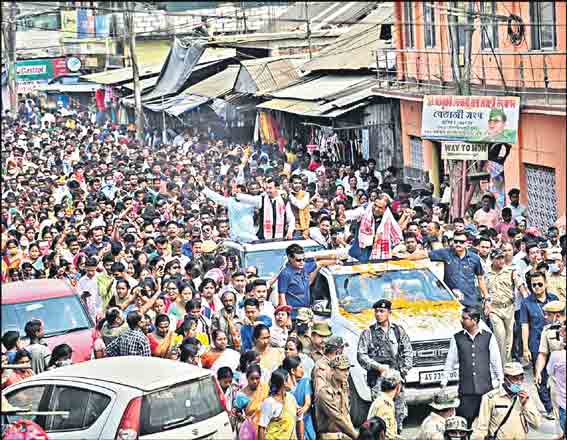While the BJP is trying its best to form government in West Bengal and Puducherry and to improve its performance in Kerala in the forthcoming Assembly elections, the toughest challenge the party is facing this time is in Assam. The BJP is aware that it will not be as easy as in 2016 when it had overthrown the 15-year rule of the Congress in the State. The situation has changed, particularly after the enactment of the Citizenship (Amendment) Act (CAA) and the BJP’s inconsistent stand on the National Register of Citizens (NRC).
The high-profile campaign, along with spectacular roadshows, frequent visits of almost all BJP stalwarts, including Prime Minister Modi, to Assam during the last three weeks and their frantic narratives against the grand alliance of Congress, the Badruddin Ajmal-led All India United Democratic Front (AIUDF), the Left parties, and a number of regional parties, indicate that the ruling party is apprehensive of retaining power in the State.
Previous Election
In 2016, the BJP, Asom Gana Parishad (AGP) and Bodoland Peoples’ Front (BPF) formed an alliance and won 60, 14 and 12 seats respectively in the 126-member Assembly. The BPF has now exited the alliance and joined the Congress-led alliance after the BJP aligned with BPF’s rival United People’s Party Liberal (UPPL), jettisoning the BPF in the last Bodoland Territorial Council (BTC) elections held last year. The BPF could not retain power in the BTC despite being the single largest party due to the post-electoral alliance between the UPPL and the BJP.
In 2016, the Congress and the AIUDF fought each other. The Congress won 26 seats while the AIUDF bagged 13. The BJP, AGP and the BPF together garnered 41.49% of the total votes with a lion’s share of 29.51% going to the BJP. Congress’ share was 30.96% while the AIDUF’s 13.05%. The electoral arithmetic is complex and one cannot compare the figures of 2016 to arrive at a conclusion now.
Advantage Opposition
However, this time the advantages go to the opposition due to the deteriorating socioeconomic conditions — growing anti-CAA sentiment coupled with a high rate of unemployment and steep price rise. The rise of small regional parties after the anti-CAA stir will also impact the outcome. The Asam Jatiya Parishad (AJP), a new regional party formed by the All Assam Students Union (AASU), the jailed social activist Akhil Gogoi led Raijor Dal and Anchalik Gana Morcha led by Rajya Sabha member Ajit Kumar Bhuyan are among the new regional forces.
The BJP government has launched many cash transfer welfare schemes in the State targeting potential voter groups. It has set a new trend in Indian electioneering by transferring cash to different groups to woo their votes. Such schemes yielded a good result in the Bihar Assembly elections. Just before the Assembly polls in Assam, the State government provided financial assistance of Rs 3,000 each to around 7.47 lakh tea garden workers.
But during its election campaign in 2016, the BJP promised that if it came to power, the daily wages of tea garden workers would be revised to at least Rs 351. This was a long pending demand of the tea garden workers but all it did was to increase it by Rs 30 to Rs 167 per day. The Tea garden labourer’s union have rejected it and said the BJP government has betrayed them. Assam’s tea tribe community constitutes around 20% (70 lakh) of the State’s 3.5-crore population and has played a decisive role in determining electoral outcomes.
Internal Issues
The ruling BJP is not only facing a formidable challenge from the grand alliance led by the Congress but is also facing problems within the party. Many BJP leaders have quit the party after they were denied ticket. One such sitting BJP MLA alleged that the BJP’s criteria for choosing candidates were based not on performance but on the quality of appeasement of a powerful party lobby.
The opposition, particularly the Congress, too has faced rebellions from aspiring candidates. Former Minister and veteran Congress leader and sitting MLA from Golaghat, Ajanta Neog, has joined the BJP and is now contesting from Golaghat while Bitupan Saikia who contested from the BJP in 2016 has joined the Congress after he was denied ticket. The Congress without any hesitation offered him the ticket from the constituency. Those who have swapped party have no hesitation to attune themselves with adverse principles and policies of the party they joined.

Falling Short
The opposition is cashing in on BJP’s failure in implementing its poll promises. Modi, during his electoral campaign in 2016 promised that if the BJP came to power, it would deport all foreigners, particularly illegal infiltrators from Bangladesh. Its manifesto promised implementation of the Assam Accord in letter and spirit. The CAA has betrayed the people of Assam and the Assam Accord as it wants to settle as many Hindus from Bangladesh, Pakistan and Afghanistan, who seek Indian citizenship.
Bhasco De Saikia, chief convener of the newly formed Raijor Dal, said only 5 of the 476 promises made by the BJP in 2016 have been fulfilled and 46 have been completed partially. But the ruling party through its high budgeted propaganda caricatures claims it has done much for the development of the State.
However, the ground reality is different. For example, 70% of the people in Guwahati don’t have potable water. Most of the internationally funded water supply projects are lying incomplete due to corruption and lack of political will. The investigation report into the Rs 6.5-crore Louis Berger bribery scam, involving the city water supply project, is yet to be made public.
Given these developments, it can be safely said that the BJP will face one of its toughest electoral fights in Assam.
(The author is a senior journalist from Assam)
Now you can get handpicked stories from Telangana Today on Telegram everyday. Click the link to subscribe.
Click to follow Telangana Today Facebook page and Twitter .